Sea Adventure
(Baonghean) - The sea, life, and survival depend on the waves, forcing fishermen to leave their hometowns to wander here and there. And their fishing activities are like an adventure...
I don't know since when the embankment belongs to the area.Anchoring boats to avoid natural disasters in Nghi Tan ward(Cua Lo town) became a temporary shelter for about thirty small ships coming from Quynh Phuong ward, Hoang Mai town.
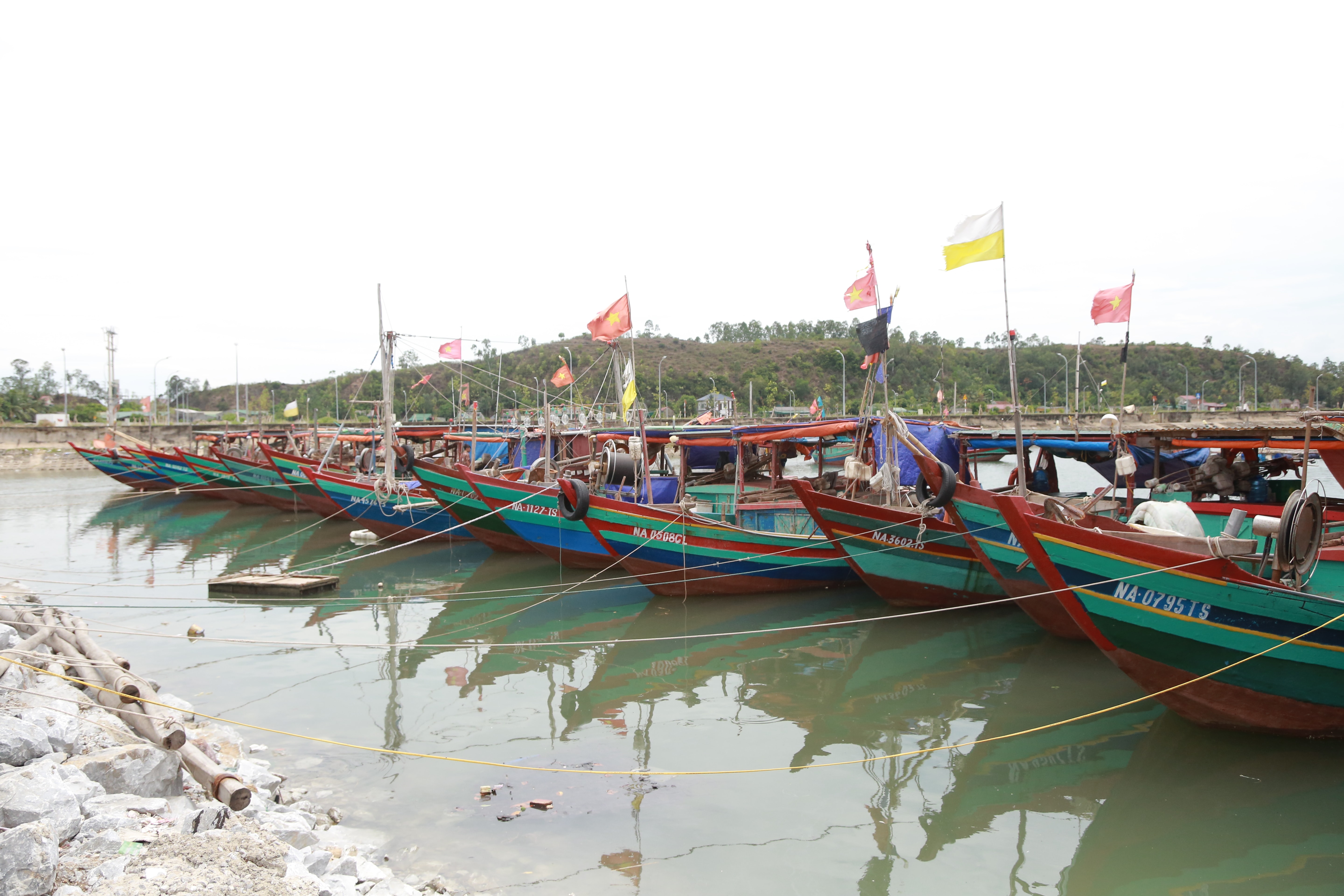 |
| Quynh Phuong fishermen's boats anchored in Nghi Tan ward, Cua Lo town. Photo: Dao Tuan |
FISHERMEN'S RESIDENTIAL VILLAGE
I arrived at Nghi Tan ward at the exact time when the ships were docked to avoid storm number 4. On the embankment, there were easily more than 20 ships resting with their bows raised in the pale sunlight. It was almost 10am but a few families were still having breakfast. A plump woman with a kind face took my hand and pulled me onto the boat.
I had just managed to stoop into the boat's cabin, and before I could sit down, I saw Ms. Bui Thi Hang - the woman's name - enthusiastically take another bowl and chopsticks and place them on the plastic sheet spread in the middle of the boat: "Please invite the family to a bowl of rice". At the same time, Mr. Nguyen Van Dung - Ms. Hang's husband also put down his chopsticks and reached for a glass placed in a small compartment in the boat's cabin. The man's voice was calm, slow, and cheerful: "It's not often that guests come to 'home', let's have a drink with me".
The wine was cloudy yellow, I didn't know what it was soaked in. Appreciating the hospitality of the middle-aged couple, I took a sip of wine and nibbled on the pieces of dried shrimp that had curled up from the saltiness.
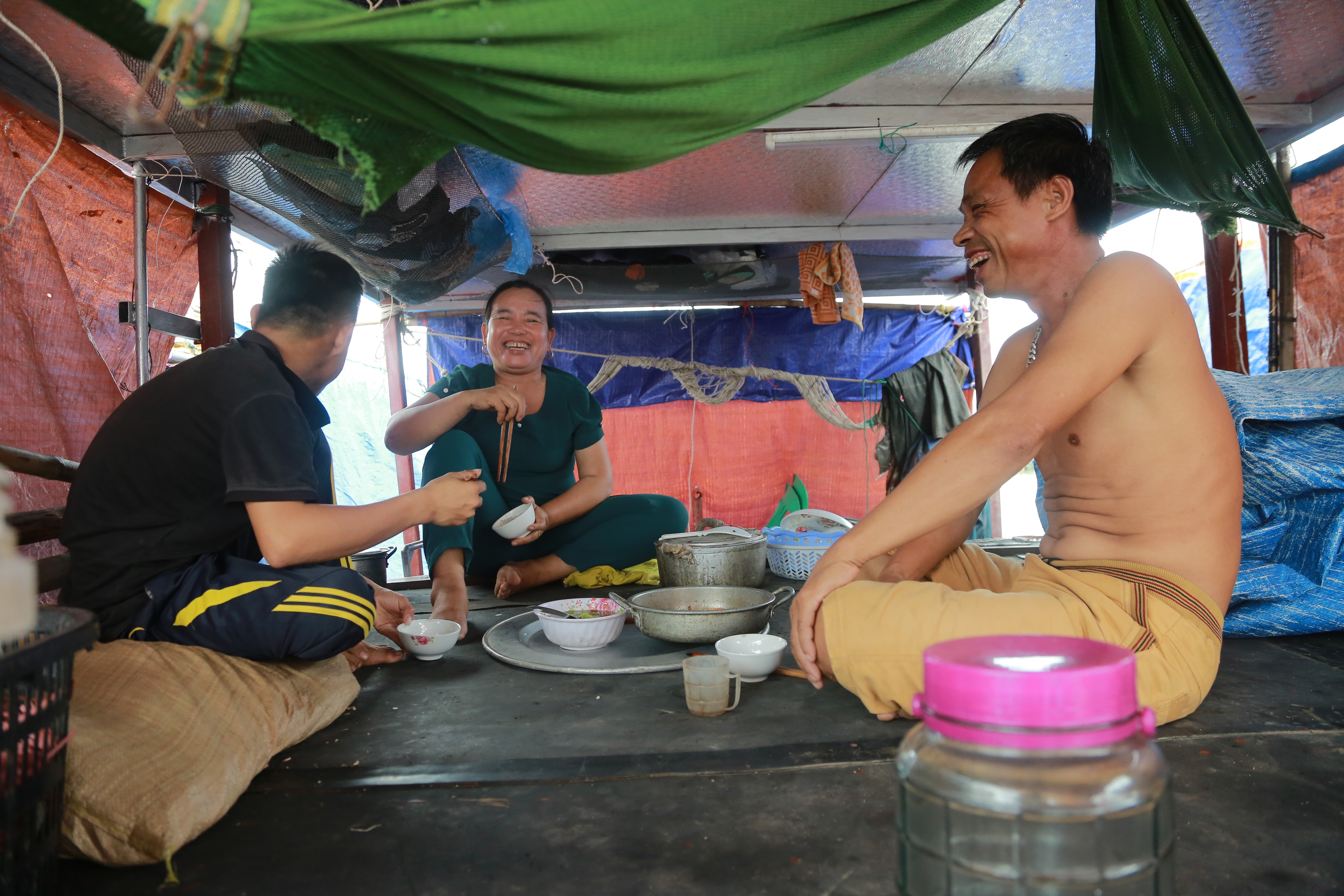 |
| Meal on the small boat of Mr. Nguyen Van Dung and Ms. Bui Thi Hang. Photo: Dao Tuan |
Mr. Dung said that his family is from Quynh Phuong ward, Hoang Mai town - the land of a generation of seafarers. However, he is not from the coastal area of Quynh. His hometown is Dien Chau, and he grew up wandering around the world with his friends. Dung said that he did not understand why once he set foot in Hoang Mai, he could not leave.
“I thought I would avoid the sea for a leisurely life, but unexpectedly I met a nun – he pointed at his wife – and got stuck with boats and fishing. So I have been at sea for more than thirty years,” said the man in his 50s.
Drifting along with the fishing season and wind and waves all year round, Mr. Dung and Ms. Hang rarely return home. Only on holidays, New Year, death anniversaries or when they have to deal with paperwork do they return to Hoang Mai. "Currently, only the daughter-in-law and the young grandchild are left at home. The son also followed his parents to Cua Lo to work," Ms. Hang said.
Not only Mr. Dung's family, but in Nghi Tan ward, there are nearly 30 families from Quynh Phuong who gather to exploit seafood. The fishing vessels are ships with a capacity of 20-40CV. Small vessels, small fishing - the fleet of Quynh Phuong households only exploits about 12-15 nautical miles from shore, sometimes reaching Hon Mat, Hon Me. The seafood exploited is mainly crab, mantis shrimp (mantis shrimp), spiny snail, fish, etc.
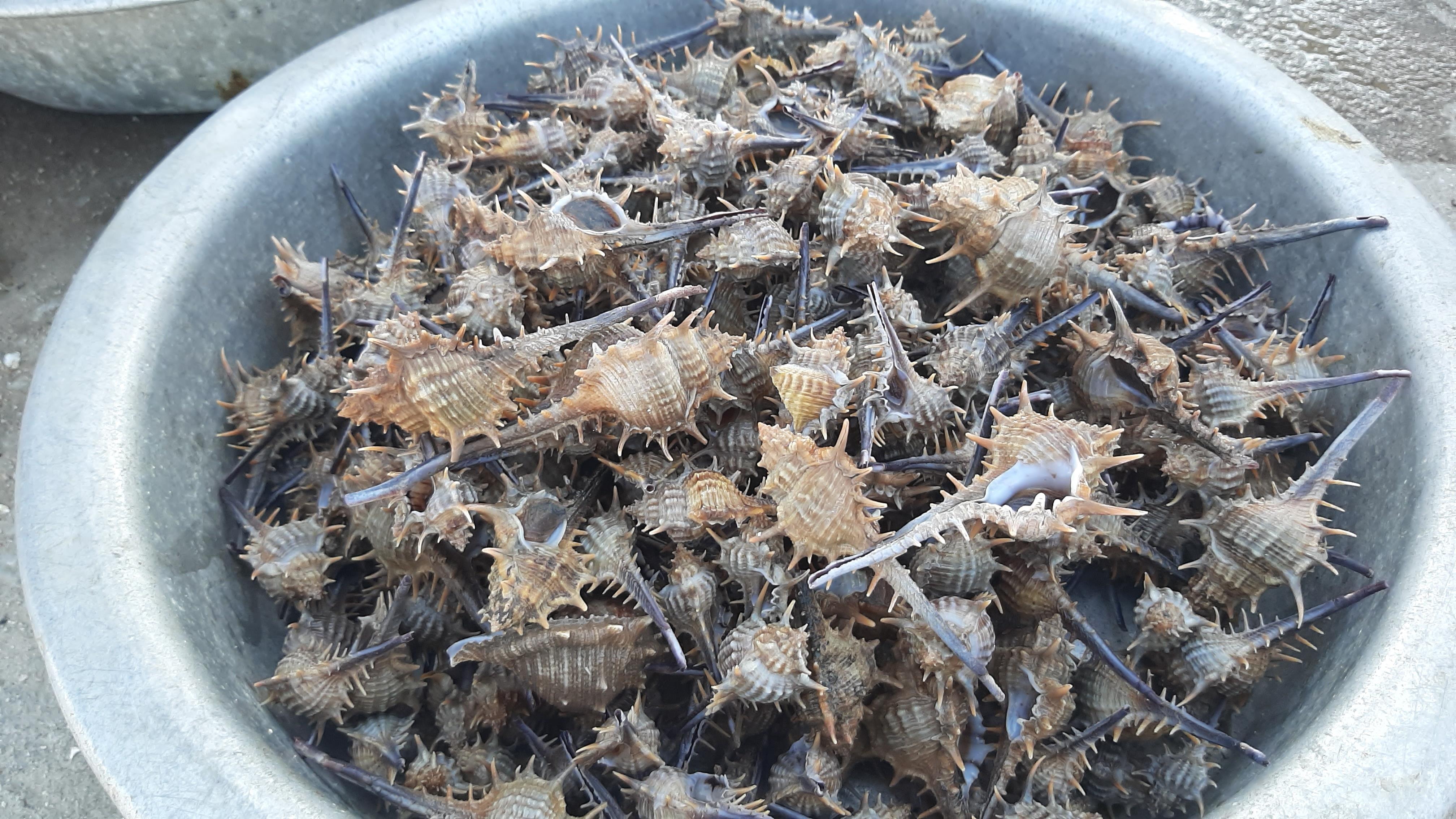 |
| Spiny snail - a type of seafood caught by fishermen Quynh Phuong. Photo: Dao Tuan |
A NEW DAY BEGINS AT MIDNIGHT
A day of the “resident” fishermen usually starts at midnight. That is the time when the fleet leaves the port. The small boats have only 2-4 men, they are father and son, brothers or relatives. However, there are also families, because of the lack of people, only one person goes fishing, so they have to both steer the boat, cast the net, and proactively face and handle problems that arise at sea. Absolutely no women go with the boat. When reaching the offshore area, it takes more than 1 hour for the fishermen to cast the nets up to 7-8km long.
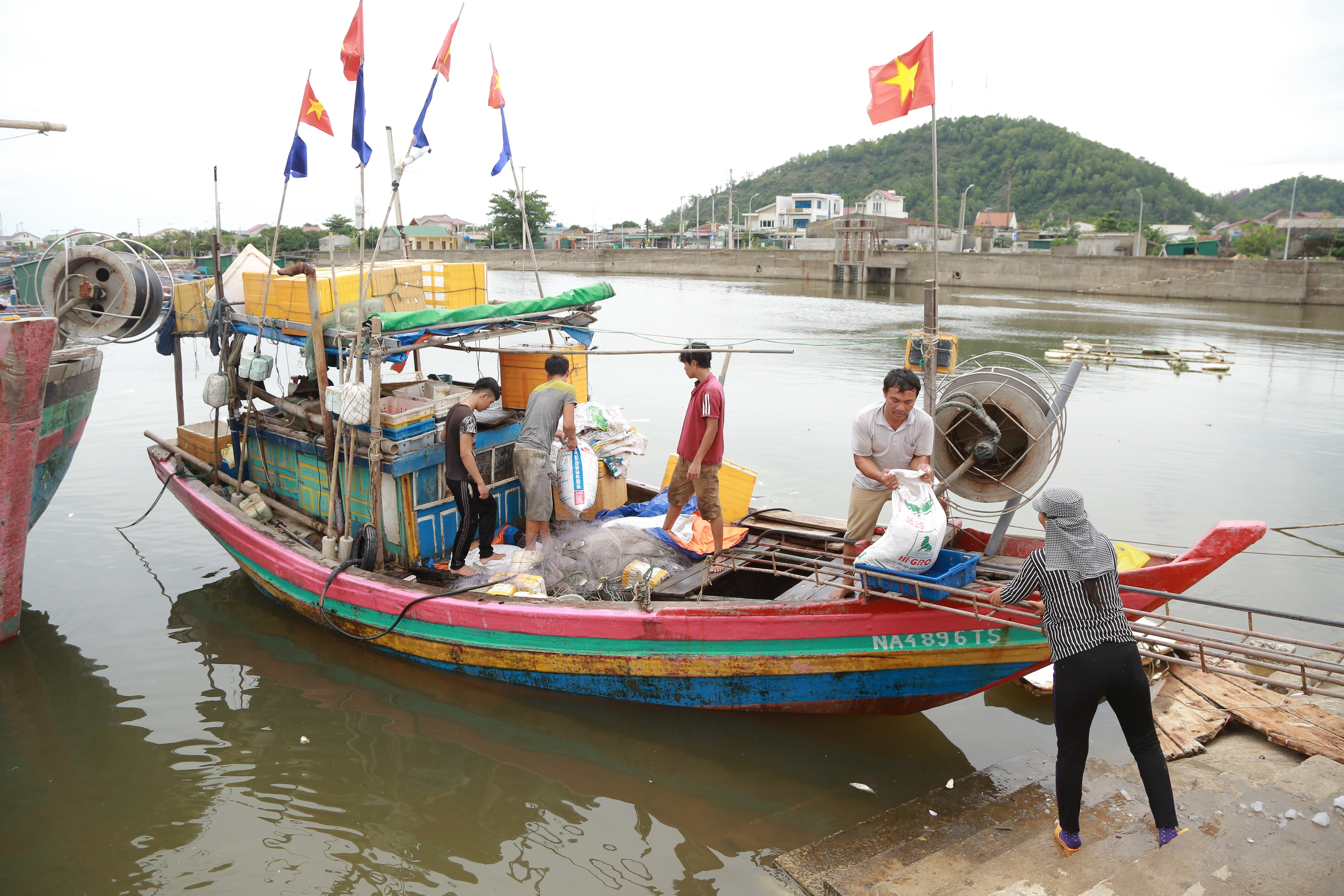 |
| A ship prepares supplies to set sail. Photo: Dao Tuan |
At this time on the shore, the women and children of the Quynh Phuong fleet gathered in a common room. It was both a boarding house and a warehouse. The room for the women and children of this “residence” village was given free accommodation by local traders, but with one condition: the seafood caught had to be imported to them.
As Ms. Bui Thi Hang shared: being able to stay and anchor boats for free is a double loss because of the low seafood prices. For example, crab, type 1 imported costs about 30,000 VND/kg, but the average price is only over 20,000 VND/kg. "Well, it can't be helped, having a place to work and living is considered okay" - Ms. Hang smiled heartily.
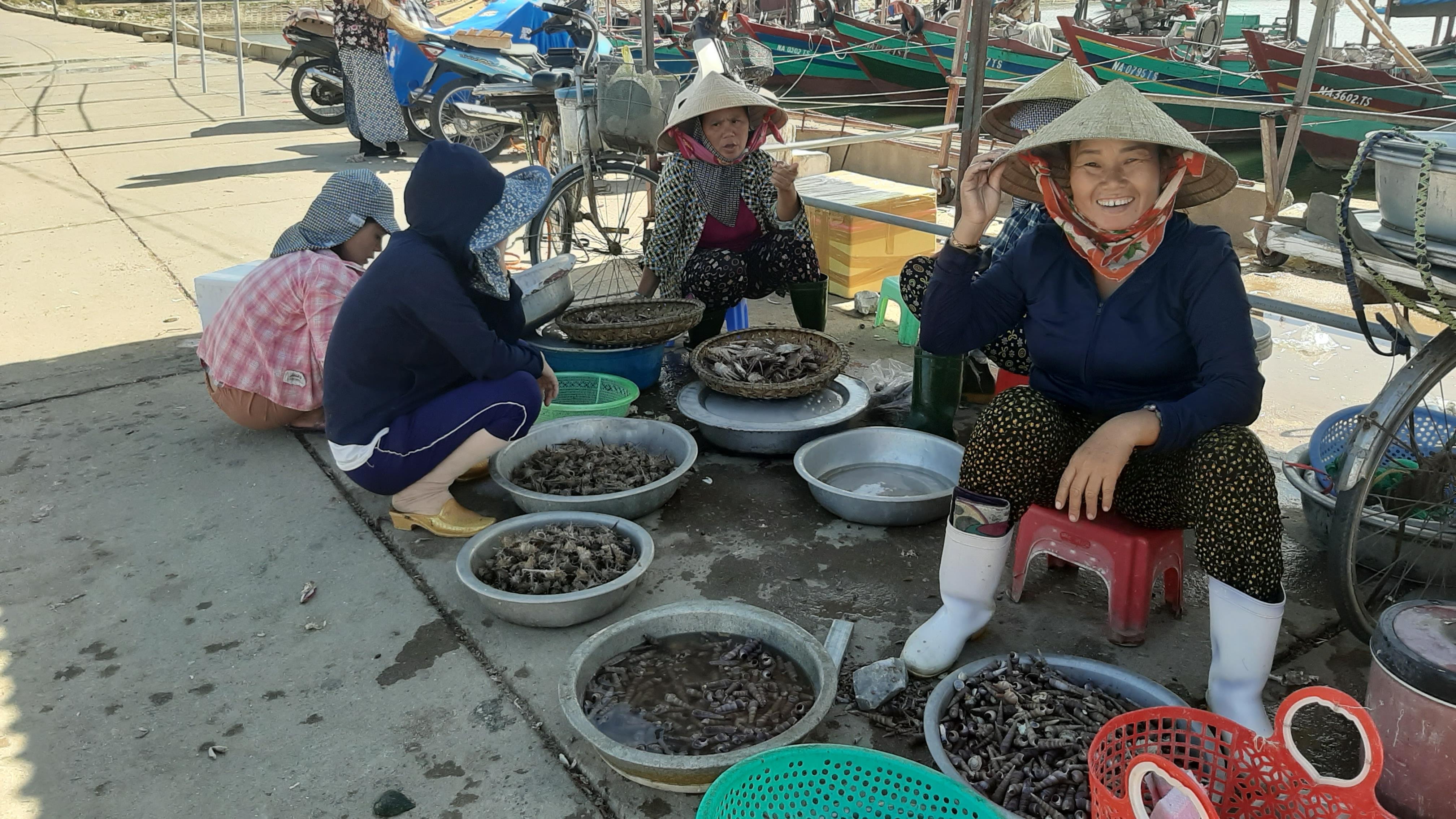 |
| After importing seafood according to the agreement with local traders, the women sell the rest right at the wharf. Photo: Dao Tuan |
Back to the men, their boat does not use light to catch fish as is common in large capacity boats. In the dark sea, they mark their presence with a few battery-powered lights tied to poles and placed in front of the bow or stern of the boat. With each wave, the lights flicker up and down. At around 4am, the nets begin to be pulled up. A winch placed on the bow of the boat effectively assists in collecting the nets. It also takes two hours to do this step. When the nets are collected, someone will turn on the stove to cook breakfast to satisfy their hunger after a hard night's work. After finishing the morning meal, the boat turns towards shore, and in the process, seafood continues to be removed from the nets.
“SEA TIGER CATCHES WILD BOAR”
At 10am, boats and ships docking sporadically. By mid-afternoon, the whole embankment becomes bustling. Women carrying trays come to the wharf to welcome their husbands. “This season, we only catch about ten kilos a day. Any family that catches a few bird’s nests can be considered a winner. There are also lucky nights when we earn a few million,” Mr. Luong Van Nam shared with me while his hand still never left the wrench to repair the machine.
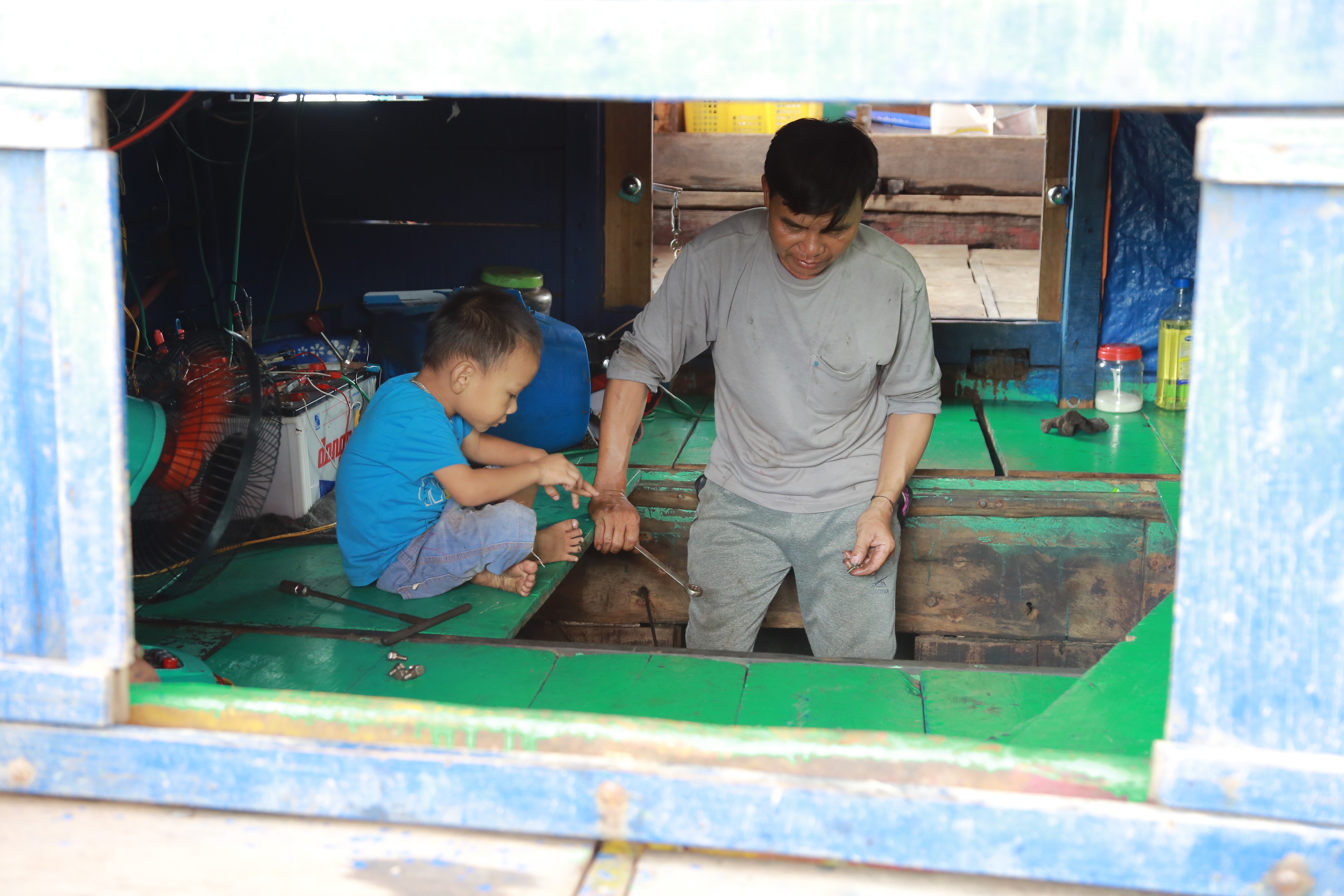 |
| While Mr. Luong Van Nam was repairing the machine, his 4-year-old son, Luong Gia Huy, could not take his eyes off his father. Photo: Dao Tuan |
There is something quite special about this man born in the year of Tan Hoi - 1971, he is a Thai ethnic, born and raised in the mountainous commune of Nghia Loi, Nghia Dan. He never thought he would become a fisherman and stick to the sea. It was all like an arrangement of fate.
In his youth, Nam worked as a forester and exploiter of forest products. One day, by chance, he met a coastal girl who brought fish to sell on the street. They got to know each other, fell in love, and fell in love. His wife, Bui Thi Hai, born in 1974, was born in the year of the tiger. He jokingly said: “I am a mountain man who was captured by a sea tiger.”
After the two got married, at first they lived together in the husband's hometown, earning a living by burning wood and selling charcoal, then they followed the fish trade in all the villages of Phu Quy land. But in the end, the money they earned was not much, so the couple took their children and returned to Quynh Phuong, the wife's hometown.
Nam began to learn the seafaring profession from his father-in-law and brother-in-law. “You don’t know, but even now, after 20 years of sailing at sea, I still can’t forget the feeling of uncertainty and instability of the first days at sea. At that time, I wanted to leave my wife’s hometown several times.” However, the man with tanned skin could not go. Gradually, he became more comfortable with the waves, familiar with the current, able to look at the stars, measure the wind direction to go out to sea. He was even proficient in repairing machinery. Interestingly, Ms. Bui Thi Hai - Mr. Nam’s wife is the younger sister of Ms. Bui Thi Hang. “The whole family works at sea, when my daughter got married and moved out, they both also worked at the sea” - Mr. Nam laughed.
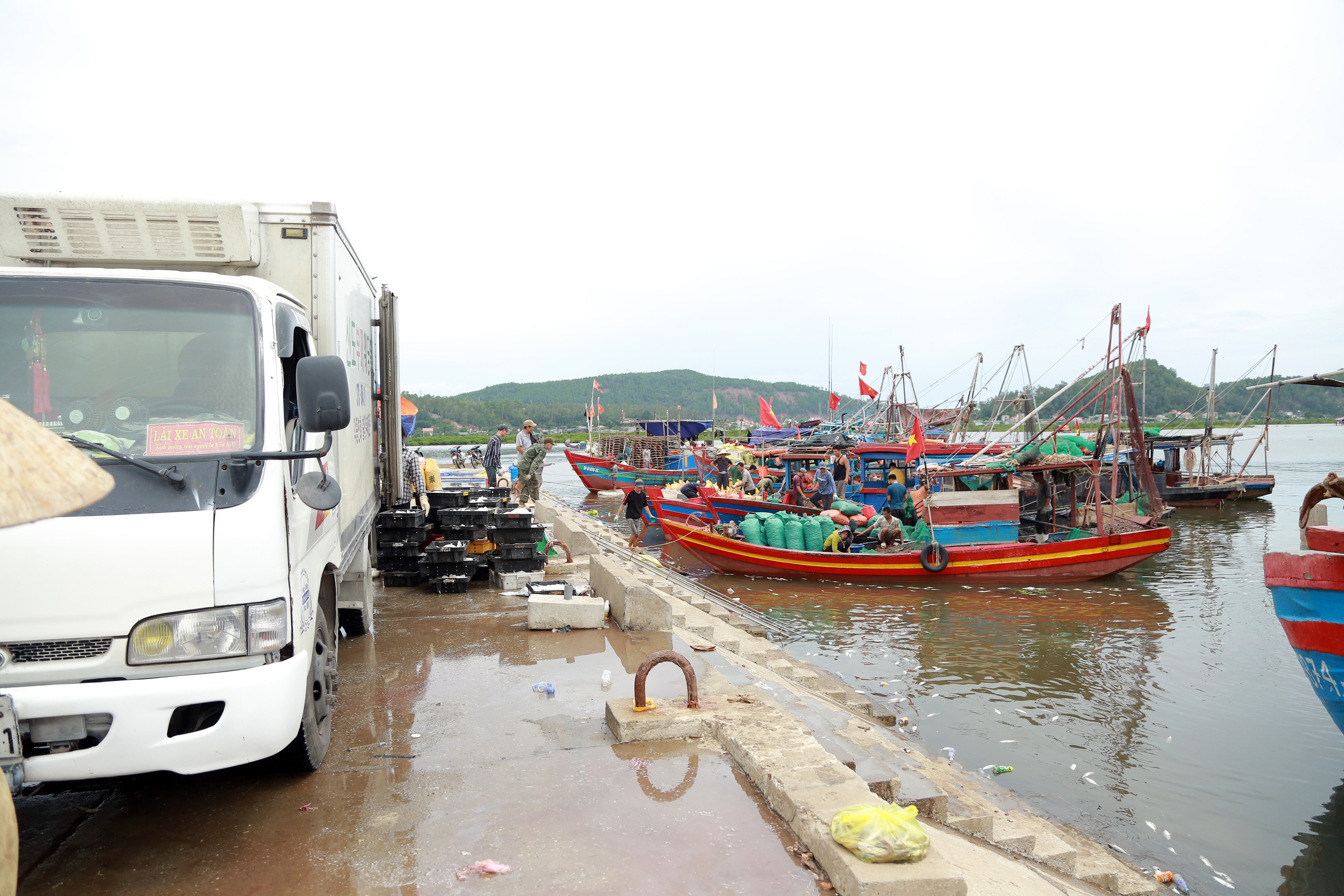 |
| Ships have just arrived. Photo: Dao Tuan |
Temporarily residing to work in Cua Lo, in addition to the eldest son who works with his father, Mr. Nam and his wife also brought their youngest son, who is only 4 years old. "Gia Huy is the only child left" - Ms. Hai laughed - "When he came here, I asked for him to go to the local kindergarten. On days off, he goes on the boat to play with his parents, and at night he goes back to his rented room. That's life."
They also work at sea, but why don’t they stay in their hometowns and have to wander around? I asked the men and women in Quynh Phuong about this concern. They said that to catch crabs and mantis shrimps, they have to go to Cua Lo and Cua Sot (Ha Tinh). In the first half of the year, they go to Cua Lo, and in the second half, they go to Cua Sot. The money they earn is not much, but selling seafood and avoiding storms is what fishermen need most.
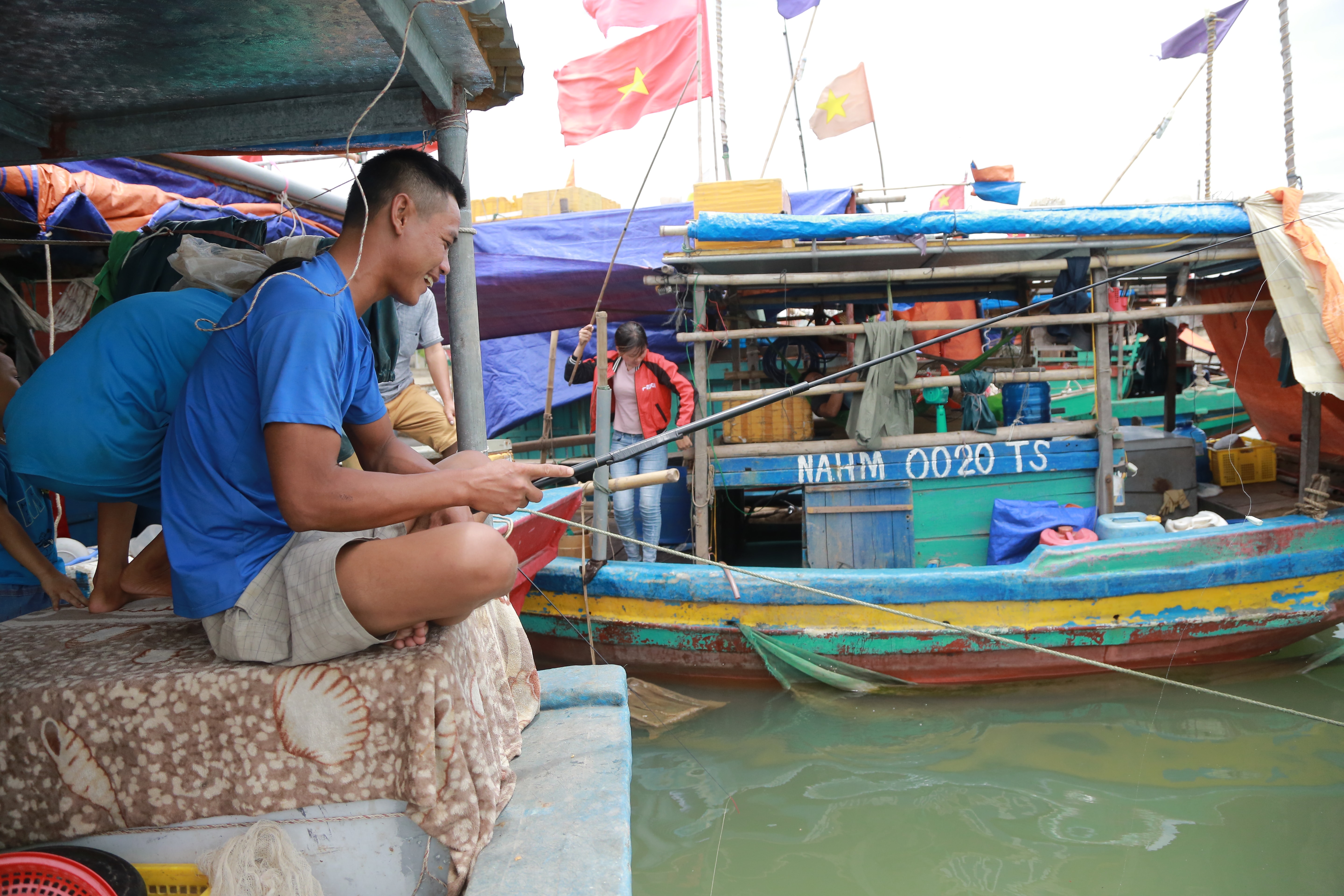 |
| When the boat is docked, the joy of fishermen here is recreational fishing. Photo: Dao Tuan |
Saying goodbye to these simple people makes me happy.
The storm had just passed, and from the boat, the children of the slum jumped into the clear blue water. On the other side, a group of men and women held small rods, using flour bait to catch silver pomfret – also known as linh kinh. Every time they pulled up a fish, the whole area laughed loudly.

